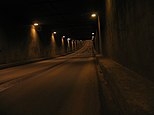Kanonersky Tunnel
 Underwater part of a tunnel | |
| Overview | |
|---|---|
| Location | Kirovsky District of Saint-Petersburg, Russia |
| Coordinates | 59°54′13″N 30°13′28″E / 59.90361°N 30.22444°E |
| Start | Dvinskaya street of Gutuevsky Iseland |
| End | Kanonersky Island |
| Operation | |
| Work begun | 1970[1] |
| Constructed | 1970-1983[1] |
| Opened | 29 July 1983[2] |
| Closed | 1983 (three months) |
| Owner | Saint Petersburg City Administration |
| Operator | SUE "Mostotrest"[1] |
| Traffic | Automotive |
| Character | City automobile movement |
| Vehicles per day | 1500[1] |
| Technical | |
| Length | 927 metres (3,041 ft),[3] 647 metres (2,123 ft) (between portals) |
| No. of lanes | One in each part |
| Operating speed | 60 kilometres per hour (37 mph) |
| Width | 8.5 metres (28 ft) (roadway) |
This article contains translated text and needs attention from someone fluent in Russian and English. |
Kanonersky Tunnel (Template:Lang-ru[4]) is a tunnel under the Sea Canal[5] in the Kirovsky District of Saint-Petersburg. The tunnel provides a link between Kanonersky Island and Dvinskaya Street on Gutuevsky Island.
A new toll road, the central section of which is still under construction, will soon provide a north-south corridor over the island.[6]
History
Kanonersky Island is an industrial area of St. Petersburg, home mostly to large shipbuilding enterprises. Before 1983, the only way to get to this location was through a ferry ride across the Morskoy Sea Canal (it was the last ferry line of Saint Petersburg) or a private boat. The crossing was also necessary for the transportation of cargo from Big port Saint Petersburg.[7]
The tunnel project was prepared by Lengiprotrans[2] while the building work was carried out by Giprostroymost.[8] Geodetic maintenance of the building was assigned to the Petersburg State University of Means of Communication.[9]
The Tunnel was built using a method of buried sections: in the preliminary trench five identical sections were laid, each of which had a length of 75 metres (246 ft) and weighed about 8,000 tonnes (8,800 short tons). The length of the site dipping sections totalled 375 metres (1,230 ft).
For the building of the sections on the bank of the Sea Canal, the original dock-sluice was constructed. After sluicing the created sections, the end faces were closed by metal partitions. They were counterbalanced by water and transported along the Sea Canal to the place of immersion. They were then joined to an earlier established section, forming a uniform design. For the control of the immersion, divers worked underwater.[8]
The full length of the tunnel was 927 metres (3,041 ft).[3] The tunnel has two lanes and a footpath. Along with cables for electrical supply and communication; water supply and central heating pipes connect Kanonersky Island with the city.[10]
Operation
Periodically water gets into the tunnel because of defects in the waterproofing. After a soft opening of the tunnel, it was closed again for three months to complete major repairs.[3] In 2004, Lengiprotrans repair work was also carried out.[2] In 2006, there was a mooring damaged over the tunnel, from it the tunnel was also damaged.[11] At the end of June 2009, tunnel repair was again required, after it was determined that the drainage system needed a replacement.[12]
Serious failures in the tunnel are rare because of low speeds. Repair of the damages can, however, take some time.[13]
References
- ^ a b c d Уникальный ремонт подводного тоннеля на Канонерский остров через Морской канал в Санкт-Петербурге будет закончен в конце 2002 года (in Russian). Saint Petersburg, Russia: Saint Petersburg Business Guide. 2001-08-16. Retrieved 2009-11-04.
{{cite news}}: External link in|publisher= - ^ a b c "Lengiprotrans: objects" (in Russian). Russia: Lengiprotrans. Retrieved 2009-11-04. [dead link]
- ^ a b c Kelner, Irina; Alexei Kuznetsov (2004). Часть города / Канонерский остров [Kanonersky Island]. Адреса Петербурга [Addresses of Petersburg] (in Russian). Saint Petersburg, Russia. Archived from the original on 2011-09-03. Retrieved 2009-11-04.
- ^ This is an informal name, but used by inhabitants, mass-media and state structures
- ^ "Kanonersky Tunnel". Retrieved 5 December 2016.
- ^ [Большой порт Санкт-Петербург, "Parameters WHSD"]. Retrieved 5 December 2016.
{{cite web}}: Check|url=value (help) - ^ "Part of the City/Gunboat Island". Archived from the original on 29 April 2017. Retrieved 5 December 2016.
- ^ a b Канонерский тоннель г.Санкт-Петербурге. Projects: Tunnels (in Russian). Saint Petersburg, Russia: Giprostroymost. Retrieved 2009-11-04.
- ^ Кафедра "Инженерная геодезия" (in Russian). Saint Petersburg, Russia: Petersburg State University of Means of Communication. Retrieved 2009-11-04.[permanent dead link]
- ^ Tumakova, Irina. К владычице морской как уплыл за границу канонерский завод (in Russian). Saint Petersburg, Russia: Lawmix.ru. Retrieved 2009-11-04.
- ^ Timofeev, E. P. Не спекулируйте, господа (in Russian). www.1917.com. Retrieved 2009-11-04.
- ^ Предстоящей ночью ограничат движение в Канонерском тоннеле. Roads (in Russian). Karpovka.net. 2009-06-30. Retrieved 2009-11-04.
- ^ Фоторепортаж с места аварии в Канонерском тоннеле. Сейчас движение уже открыто. Incindents (in Russian). Saint Petersburg, Russia: fontanka.ru. 2006-10-05. Retrieved 2009-11-04.
{{cite news}}: External link in|publisher=

